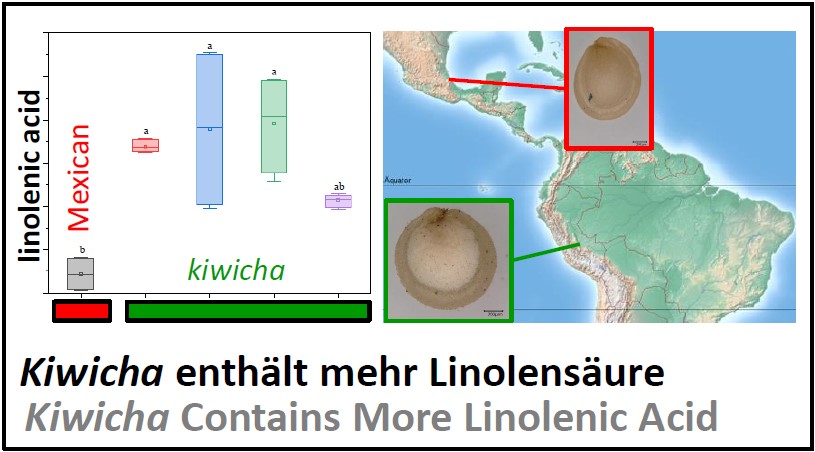 |
02.06.2023: Kiwicha contains more Linolenic Acid.Unfortunately, Amaranth is underexplored in terms of molecular biology. We have, therefore, first deciphered the entire genome for two selected genotypes. In addition to one genuine kiwicha (A. caudatus) from the Urubamba valley near Cusco, we investigated one type of the Mexican species A. hypochondriacus. By help of these genomes, we succeeded to identify important key genes for the synthesis of unsaturated fatty acids. The DHA metabolism runs parallel with the activation of jasmonates (both compete for the precursor α-Linolenic Acid). We know that jasmonates (a kind of plant adrenalin) are central for the response to cold. Therefore, we also identified pivotal genes for jasmonate synthesis and response, but also central switches of cold adaptation. The behaviour of these genes and theirconnection with fatty-acid metabolism were then compared under the conditions of South Germany. Here, we found that the investigated kiwicha types accumulate significantly higher levels of the valuable unsaturated fatty acid linolenic acid than Mexican Amaranth. We can show that this is linked to a different response to chilling during flowering - evolutionary footprints of the different domestication history in either the subtropical Mexico or the Andean mountains.
This comprehensive study explains, why kiwicha accumulates more unsaturated acids and has now appeared in the International Journal of Molecular Sciences:
Publication: Kanbar A, Beisel J, Gutierrez MT, Graeff-Hönninger S, Nick P (2023) Peruvian Amaranth (kiwicha) Accumulates Higher Levels of the Unsaturated Linoleic Acid. Int J Mol Sci 24, 6215 - pdf |
News
 |
02.06.2023: Kiwicha contains more Linolenic Acid.Unfortunately, Amaranth is underexplored in terms of molecular biology. We have, therefore, first deciphered the entire genome for two selected genotypes. In addition to one genuine kiwicha (A. caudatus) from the Urubamba valley near Cusco, we investigated one type of the Mexican species A. hypochondriacus. By help of these genomes, we succeeded to identify important key genes for the synthesis of unsaturated fatty acids. The DHA metabolism runs parallel with the activation of jasmonates (both compete for the precursor α-Linolenic Acid). We know that jasmonates (a kind of plant adrenalin) are central for the response to cold. Therefore, we also identified pivotal genes for jasmonate synthesis and response, but also central switches of cold adaptation. The behaviour of these genes and theirconnection with fatty-acid metabolism were then compared under the conditions of South Germany. Here, we found that the investigated kiwicha types accumulate significantly higher levels of the valuable unsaturated fatty acid linolenic acid than Mexican Amaranth. We can show that this is linked to a different response to chilling during flowering - evolutionary footprints of the different domestication history in either the subtropical Mexico or the Andean mountains. This comprehensive study explains, why kiwicha accumulates more unsaturated acids and has now appeared in the International Journal of Molecular Sciences: Publication: Kanbar A, Beisel J, Gutierrez MT, Graeff-Hönninger S, Nick P (2023) Peruvian Amaranth (kiwicha) Accumulates Higher Levels of the Unsaturated Linoleic Acid. Int J Mol Sci 24, 6215 - pdf |
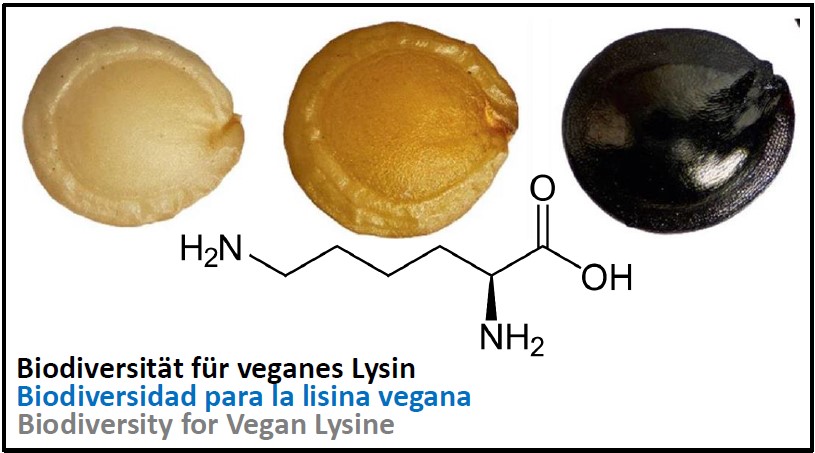 |
30.09.2022: Biodiversity for Vegan Lysine.Plant proteins are usually depleted from the important amino acid lysine. In a vegan diet, lysine must therefore often be complemented. The alternative to the lysine pill would be plant foods with a high lysine content. In his Master thesis, Johannes Gröne has, therefore, measured more than 80 different Amaranth genotypes from the KIT collection and found substantial differences. Ideal would be 45 mg/g protein. Beef or Thuna as lysine-rich foods reach up to 20 mg/g. Rice has only one tenth of this, wheat only one fifth. The champion in our collection is the kiwicha (Amaranthus caudatus) genotype 8301 with 22 mg/g. It originates from the region of Cusco. On the other hand, genotype 8300, from the same region, shows only 15 mg/g, which is much less. Together with his supervisor, Dr. Adnan Kanbar, Johannes Gröhe could poinpoint, which genes of lysine biosynthesis are crucial here and how their activity depends on the environment. On the base of this knowledge, it is now possible to breed lysine rich varieties. Contact: Prof. Dr. Peter Nick |
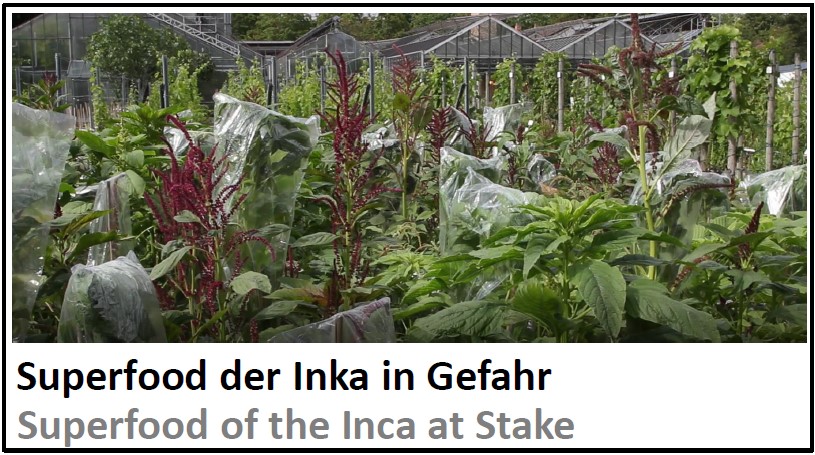 |
22.07.2022: Acid Test for Kiwicha.The true Peruvian Amaranth (A. caudatus), also named as Kiwicha, used to be one of the superfoods of the Incas. No wonder, its high content of antioxidants and unsaturated fatty acids, but also of the amino acid lysine, often depleted in vegan diets, renders Kiwicha into a kind of miracle food. However, in international trade it is overrun by its Mexican cousins, A. hypochondriacus und A. cruentus. Even Amaranth growers in Peru plant often imported seeds and think they used Kiwicha. Using genetic barcodes, we have now developed an authenticity proof, whereby a simple PCR fingerprint can testify true Kiwicha rapidly and reliably. A field study with 12 samples collected summer 2021 in Peru showed that 2 of those (15%) were "faked Kiwicha". The study, conducted by our colleage Dr. Adnan Kanbar together with the University of Hohenheim appears now in the peer-reviewed journal European Journal of Food Research and Technology. This allows to secure authenticity of Amaranth seeds in Peru - if the political will to do so is present. Contact: Prof. Dr. Peter Nick
Publication: Kanbar A, Beisel J, Wetters S, Gutierrez MT, Graeff-Hönninger S, Nick P (2022) A rapid, simple, and reliable assay to authenticate Peruvian kiwicha (A. caudatus) for food applications. Eur J Food Res Technol, doi: 10.1007/s00217-022-04089-6 - pdf |
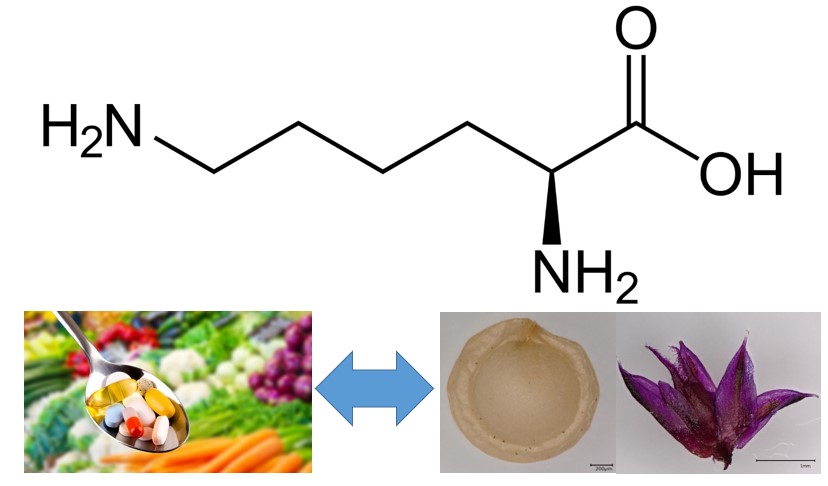 |
01.04.2022: Hunting Lysine.
So far, mainly omega-3-fatty acids were in the focus of the project. However, Peruvian Amaranth (kiwicha) has more to offer. Already Luis Sumar Kalinowski, who rediscovered kiwicha in the 1970s and propagated its cultivation in Peru, initiated research on protein content and composition of different Amaranth species. These studies showed that kiwicha exhibited high contents of the essential amino acid lysine. This building block for proteins is relatively „expensive“ for plants, because it harbours a second amino group, which requires bio-available nitrogen. Therefore, plant proteins are often containing less lysine than proteins from animal origin. Who is living on a vegan diet, must therefore take care to get a sufficient intake of lysine. Frequently, this rare amino acid is complemented as food supplement. Actually, we deem this unnecessary. We might rather learn from the Inca and just consume a daily amount of kiwicha to cover our lysine demand. Thus, we have started to screen our Amaranth collection for varieties that are efficient in accumulating lysine. Contact: Prof. Dr. Peter Nick |
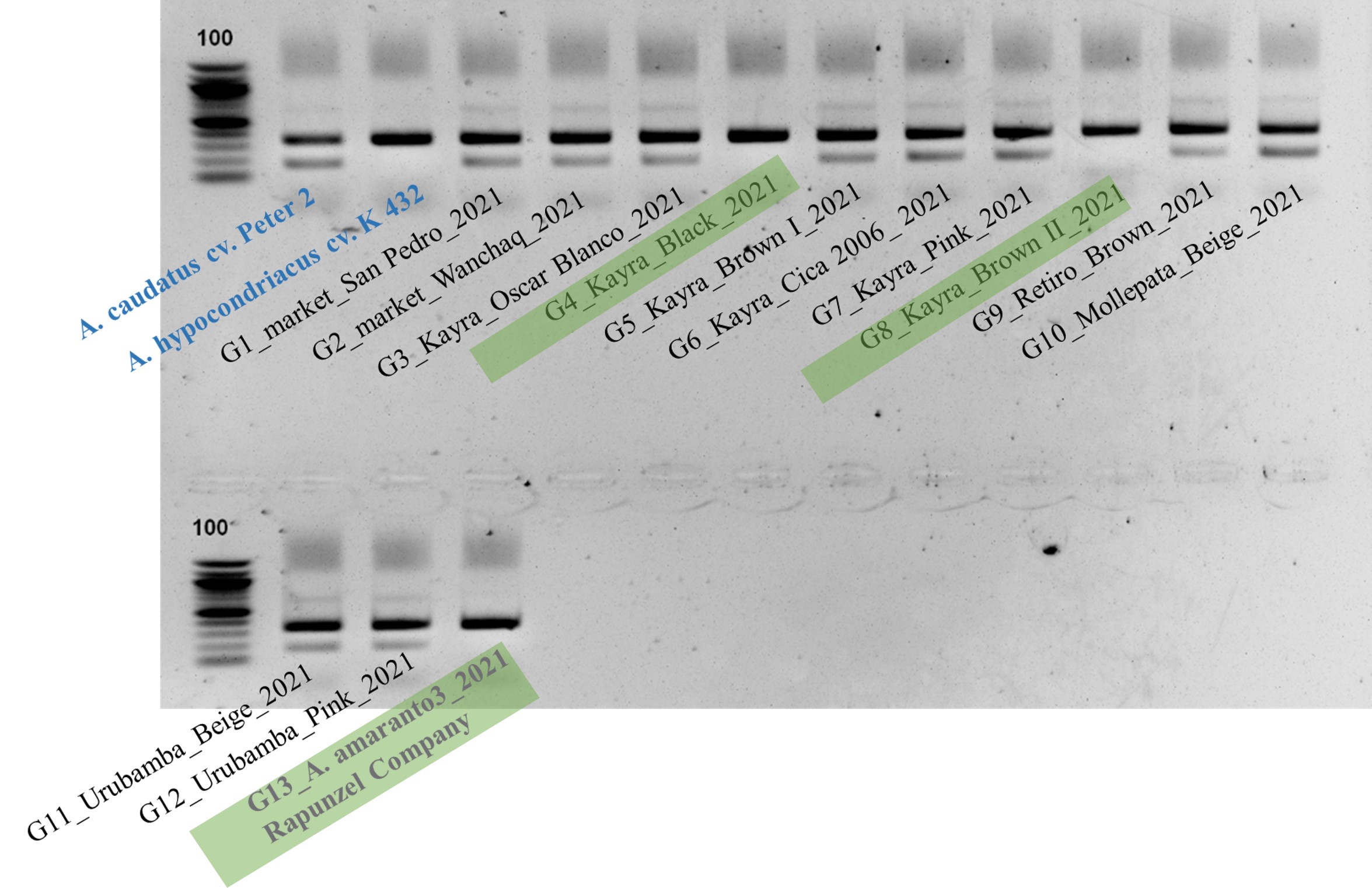 |
21.01.2022: Endangered Kiwicha.The True Peruvian Amaranth (A. caudatus), also known as Kiwicha, has not been as intensively subject to breeding as compared to its Mexican sisters that also dominate international trading. However, kiwicha provides several nutritional advantages, such as a higher activity of antioxidants, a higher content of unsaturated fatty acids, and a higher content of the amino acid lysine, which is often underrepresented in plant proteins. To safeguard and develop these valuable traits, it is crucial to preserve the authenticity of seed material. Unfortunately, many Amaranth growers, in Peru and elsewhere, are not aware of the differences between Amaranth species. As a result, growers often use imported seeds. This could pose a serious threat to the existence of Kiwicha, not only, because it is more rarely planted, but also, because there will be introgression from imported varieties, such that its authenticity is on stake. We wanted to find out, whether these considerations are just academic spectres, or whether this problem has already turned relevant. The answer is a clear YES. Out of 12 seed samples that were collected in Peru in summer 2021, 3 turned out to be "fake Kiwicha". The genetic fingerprint developed by our colleague Dr. Adnan Kanbar could detect this beyond doubt. Thus, it is urgent to come up with ideas, how quality and authenticity of Amaranth seeds in Peru can be preserved. Contact: Prof. Dr. Peter Nick
|
